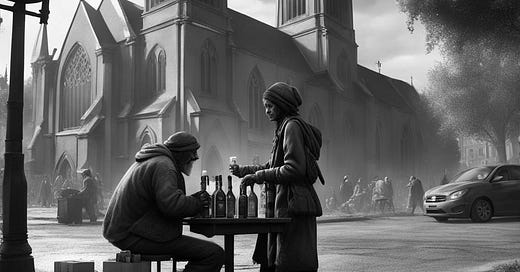#17 Baptists & Bootleggers
When policy brings the righteous and the unrighteous together!
Frameworks
This post comes under the sub-section Frameworks. Under Frameworks we discuss some broad ideas, rules, quick-hacks, and principles that could be applied in a variety of policy related situations. You can use them as cutlery to have a good policy meal!
‘Bootleggers and Baptists’ was a framework introduced by economist Bruce Yandle in a piece he wrote in 1983. He provided this framework to look at the supply and demand of government regulations across the world.
But before we generalise the framework to all government regulations, let me take you back to the early years of the United States, to the world of baptists and bootleggers, from where this framework got it's name.
The Backstory
There was time when drinking alcohol was illegal on Sundays in some states in the USA. On the surface, the regulation was meant to motivate people to attend church on Sundays instead of sipping spirits at home. But beneath the rubble of the regulation, there was a strange and surprising alliance between two very different groups of people: the bootleggers and the Baptists.
Bootleggers were the folks who illegally produced and sold alcoholic beverages. They were, in essence, the lawbreakers who looked to profit from the ban on alcohol. The ban on Sundays led legal alcohol suppliers to shut shop. This opened up a lucrative black market for the alcohol sold by the bootleggers.
On the other side, you had the baptists, the religious leaders, and the moral crusaders. They advocated for the prohibition of alcohol. They believed that drinking was sinful and led to all sorts of societal ills. They pushed for strict anti-alcohol laws, often grounded in their religious convictions. If not an outright ban, a ban on Sundays, they thought, was the morally appropriate thing to do.
Image generated on Nightcafe
Now, here's the twist: While bootleggers and Baptists appeared to be natural enemies, they often found themselves supporting the same cause—the continuation of Prohibition. Why? Prohibition benefited both groups.
The bootleggers loved it because it gave them a thriving underground industry.
The Baptists loved it because it reflected their moral stance.
This unlikely alliance between those motivated by profit and those motivated by morality created a powerful lobby that helped sustain the Sunday prohition of alcohol for much longer than it might have lasted otherwise.
The Framework
When we generalise this framework, “bootleggers” are people whose motive in seeking regulations is financial gain, and “baptists” are people who want regulations because of their moral and/or ideological priorities. While bootleggers are often hidden and fly under the radar, baptists are out in the open and project themselves as noble. But both of these groups base their positions on their own narrow self-interests.
If you look closely into the umpteen regulations we have these days, you will find baptists and bootleggers in most of them.
For example, think about the protests related to farm laws that happened recently in India. The protesting farmers, mostly from Punjab and Haryana, wanted, among other things, the institutionalisation of MSP. For the rich farmers from these states and the middlemen for whom the mandis were a den of cash flow, MSP was central to their system. Any possibility of MSPs ending might put their whole business model in jeopardy (Bootlegger). For people like us who supported the farmers’ protests, it was all about protecting the ‘poor farmer’ from ‘bad corporations’ by giving them assured income through MSPs (Baptists). Is an institutionalised MSP system good for farmers at large or for the economy? Well, we are too busy siding with the baptists, and unknowingly supporting the bootleggers, that we sometimes forget to ask these fundamental questions!
There are many other examples of bootleggers and baptists that are around us (1, 2). I spoke about the ban on e-cigarettes and the possible collusion of bootleggers and baptists in a previous post related to public choice theory. What one should understand from all these examples is this: Regulations have a cost. But governments very often manufacture resource-wasting regulations. Why? It is usually because of an unholy alliance of bootleggers and baptists in the background.
Thumb rule: If a politician is selling a regulation as being moral, understand that there are things that are not visible to the naked eye. Look closely; most often than not, you will see some bootleggers lurking around.
I would like to hear from you. Write to me at onepolicyconceptaweek@gmail.com.




